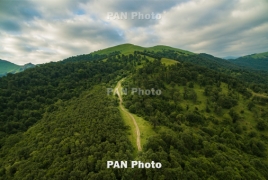The generosity of Armenians and why they love strangers: BBC October 5, 2017 - 10:42 AMT PanARMENIAN.Net - Award-winning freelance travel writer and journalist Ben Lerwill has unveiled an article about his recent trip to Armenia, the town of Dilijan, in particular, and the astonishingly generous hospitality he found there on a dizzy night. The feature, published on the BBC, details Lerwill's trip from Georgia to Armenia who had to stay in Dilijan because the marshrutkas were resolutely done for the day he reached the town. "Consulting my outdated guidebook yielded a solitary guesthouse address, which after some investigative work (I found the Armenian alphabet as impenetrable as medieval sheet music), I eventually located high up in the town outskirts. I hoped, as I climbed the street, that I might at least find someone in," Lerwill's says in his memoirs. "The house was on a quiet residential hill, set back from a dusty road behind metal gates. I knocked, and was met with a long silence. I tried hollering the Armenian words for hello – an optimistic “barev dzez” – into the driveway, first tentatively, then louder, feeling foolish. At last there were footsteps, and the gates were opened by a middle-aged lady in an apron." Meeting the guest, the lady invited him for dinner "at nineteen o'clock," and when the guest appeared in the dining room,he found himself swept into a celebration dinner for the 18th birthday of the family’s eldest daughter. "The food came in huge portions. The lady that had welcomed me in was Lusine’s (the daughter in question - Ed.) mother, and she took charge of affairs. Plates appeared piled high with lavash, the unleavened flatbread that forms the staple of the Armenian larder. There were aubergines and olives, fresh radishes and mounds of stringy cheese. Then came barbequed pork, and greens with garlic. At some point there was a bowl of chopped mushrooms fried with onions, and chicken in an unctuous, spicy sauce. The menu became something of a blur," the writer remembers. "The reason for this was the oghi, or homemade fruit vodka. I gathered, thanks to the English spoken by the birthday girl, that I had an uncle either side of me. Both were jovial and thick-limbed, and took it as their duty to ensure that my shot glass was never dry for a second longer than necessary. Just as the food was brought out liberally, so too was the potent, berry-based firewater." According to Lerwill,the evening ended with bear hugs all round, and linguistically doomed attempts to declare everlasting kinship. Only after leaving the house in the morningdid the extent of the family’s welcome sink in, he says. "Armenians, like their Caucasus neighbours, have long been renowned for generosity to outsiders. It should perhaps be pointed out that the three Caucasus nations – Georgia, Armenia and Azerbaijan – retain a healthy suspicion of each other. There’s a wry Armenian joke that sums it up. A boy asks his grandfather why Armenia hasn't yet sent an astronaut to space. “Because the Georgians would die of envy," the grandfather replies. "And if the Georgians died of envy, then we'd die of pleasure – and the Azeris would be left with all the land." Towards travellers and outsiders, however, local hospitality throughout the region is astonishingly generous. "Armenia has known unspeakable pain and hardship, not least in the form of the deportations and deaths of up to 1.5 million of its people between 1914 and 1923. Dozens of US states and 29 countries have recognised this as an act of genocide by the Ottoman Empire. Today’s Turkish state denies the description. Armenia’s national psyche has, inevitably, been shaped by the period. And in so doing, the notion that those who come in peace should be welcomed with open arms has only been strengthened. I can say this much: when you encounter hospitality in Armenia, you’re unlikely to forget it," the article concludes. Related links: The number of state universities will be reduced from 23 to 8 by 2030, Minister of Education, Science, Culture and Sport Zhanna Andreasyan has said. From September 21 to November 11, a total of 2,820 Russians registered at a place of residence in Armenia, the police has said. The situation on the contact line between Karabakh and Azerbaijan was relatively stable overnight, the Defense Army says. Defense Minister Suren Papikyan has visited the southern Armenian province of Syunik, the Defense Ministry reported on March 18. Partner news |